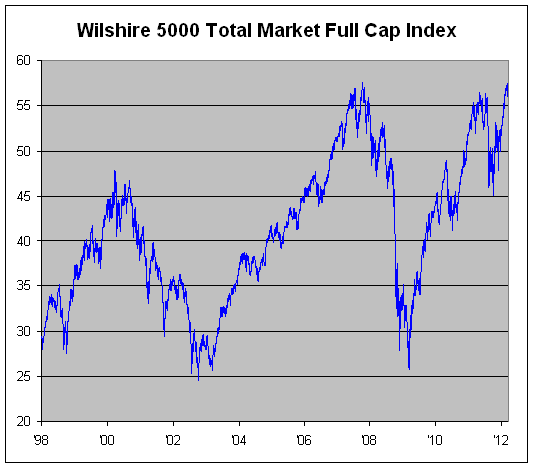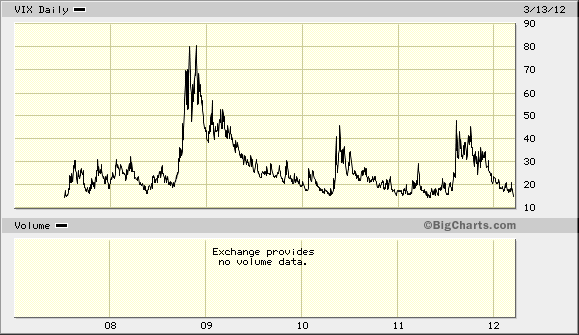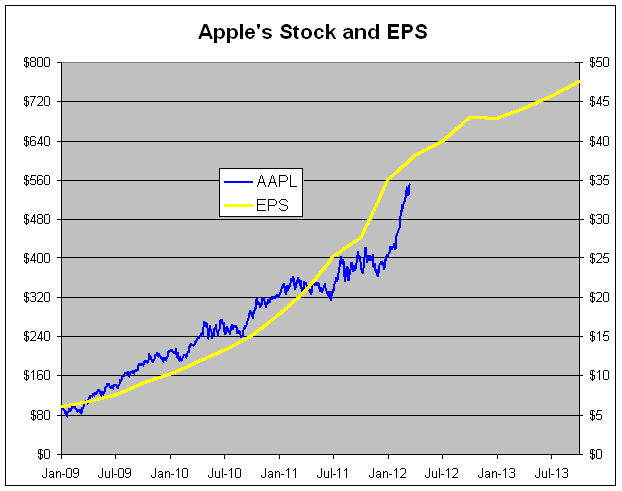Author Archive
-
Raven’s Blowout Quarter
Eddy Elfenbein, March 13th, 2012 at 2:42 pmLast year, I called Raven Industries ($RAVN) “the best company you’ve never heard of.” The company makes reinforced plastic, electronics, flow control devices, and balloons. I noted that shares of Raven were up more than 210-fold in 30 years.
Raven just reported earnings of 60 cents per share, 12 cents more than expectations. The stock has been up by as much as 6% today.
Raven said in today’s earnings report: “For the company overall, while quarterly growth in every division could be difficult to sustain in the year ahead, we believe that meeting our long-term target of at least 10 percent growth in earnings is possible.”
Look for the 26th-straight dividend increase sometime soon.
-
Tour of Ancient Rome
Eddy Elfenbein, March 13th, 2012 at 2:30 pmRome Reborn 2.2: A Tour of Ancient Rome in 320 CE from Bernard Frischer on Vimeo.
-
Today’s FOMC Satement
Eddy Elfenbein, March 13th, 2012 at 2:17 pmInformation received since the Federal Open Market Committee met in January suggests that the economy has been expanding moderately. Labor market conditions have improved further; the unemployment rate has declined notably in recent months but remains elevated. Household spending and business fixed investment have continued to advance. The housing sector remains depressed. Inflation has been subdued in recent months, although prices of crude oil and gasoline have increased lately. Longer-term inflation expectations have remained stable.
Consistent with its statutory mandate, the Committee seeks to foster maximum employment and price stability. The Committee expects moderate economic growth over coming quarters and consequently anticipates that the unemployment rate will decline gradually toward levels that the Committee judges to be consistent with its dual mandate. Strains in global financial markets have eased, though they continue to pose significant downside risks to the economic outlook. The recent increase in oil and gasoline prices will push up inflation temporarily, but the Committee anticipates that subsequently inflation will run at or below the rate that it judges most consistent with its dual mandate.
To support a stronger economic recovery and to help ensure that inflation, over time, is at the rate most consistent with its dual mandate, the Committee expects to maintain a highly accommodative stance for monetary policy. In particular, the Committee decided today to keep the target range for the federal funds rate at 0 to 1/4 percent and currently anticipates that economic conditions–including low rates of resource utilization and a subdued outlook for inflation over the medium run–are likely to warrant exceptionally low levels for the federal funds rate at least through late 2014.
The Committee also decided to continue its program to extend the average maturity of its holdings of securities as announced in September. The Committee is maintaining its existing policies of reinvesting principal payments from its holdings of agency debt and agency mortgage-backed securities in agency mortgage-backed securities and of rolling over maturing Treasury securities at auction. The Committee will regularly review the size and composition of its securities holdings and is prepared to adjust those holdings as appropriate to promote a stronger economic recovery in a context of price stability.
Voting for the FOMC monetary policy action were: Ben S. Bernanke, Chairman; William C. Dudley, Vice Chairman; Elizabeth A. Duke; Dennis P. Lockhart; Sandra Pianalto; Sarah Bloom Raskin; Daniel K. Tarullo; John C. Williams; and Janet L. Yellen. Voting against the action was Jeffrey M. Lacker, who does not anticipate that economic conditions are likely to warrant exceptionally low levels of the federal funds rate through late 2014.
-
Stock Market at All-Time High
Eddy Elfenbein, March 13th, 2012 at 1:10 pmToday looks to be the day. The Wilshire 5000 Total Market Full Cap Index is on pace to close at an all-time high today.
This is the broadest measure of the stock market and it includes dividends. If the current market holds up, we’ll exceed the peak from October 7, 2007.
On our Buy List, we had three new 52-week highs; Nicholas Financial ($NICK) got to $14.09, CA Technologies ($CA) hit $27.50 and Fiserv ($FISV) traded at $68.50.
-
The VIX Nears Five-Year Low
Eddy Elfenbein, March 13th, 2012 at 12:59 pmThis morning, the Volatility Index ($VIX) traded below 14 for the first time since June 2007.
-
10 Best Stocks of the Last 20 Years
Eddy Elfenbein, March 13th, 2012 at 11:28 amHere’s the list courtesy of Smart Money:
1. Kansas City Southern
2. Middleby
3. II-VI
4. Qualcomm
5. EMC
6. Oracle
7. Diodes
8. Biogen Idec
9. Celgene
10. Astronics -
More Good News: Retails Sales Up 1.1%
Eddy Elfenbein, March 13th, 2012 at 9:44 amThe Federal Reserve meets again today in Washington and we got more good economic news this morning. The Commerce Department said that retail sales rose by 1.1% in February. That’s the strongest growth in five months. Retail sales rose by 0.6% in January.
Details of the report were fairly upbeat and its tenor was also boosted by upward revisions to the prior months’ data, suggesting recent solid gains in employment were helping to cushion consumers against steep rises in gasoline prices.
“The big thing for the consumer is that the labor market has improved and there’s income growth. Things look better than six months ago,” said Stephen Stanley, chief economist at Pierpont Securities in Stamford, Connecticut.
…
Sales last month were buoyed by a 1.6 percent rise in sales of motor vehicles, reflecting pent-up demand by households and growing confidence in the economy as job creation speeds up.
A devastating earthquake and tsunami in Japan caused disruptions to auto production last year and left dealers without models that consumers wanted to buy.
Excluding autos, retail sales advanced 0.9 percent last month, adding to January’s upwardly revised 1.1 percent gain.
Consumers bought motor vehicles even as they paid more for gasoline at the pump. Gas prices rose 20 cents last month, according to government data.
Sales at gasoline stations surged 3.3 percent, the biggest gain since March last year, after rising 1.9 percent in January. Excluding autos and gasoline, sales rose 0.6 percent in February after increasing 1.0 percent the prior month. Gasoline accounted for 11.5 percent of retail sales in February.
-
How Much Is Apple Worth?
Eddy Elfenbein, March 13th, 2012 at 8:55 amApple‘s ($AAPL) stock just hit another all-time high yesterday. The shares have been going up, up and up, yet they’re still under-priced.
Today, let’s take a cold look at Apple’s valuation. For this, I’m just going to use a dispassionate analysis of the numbers. No fancy New Age metrics. First, I have to say that Apple is a ridiculously profitable company. The firm generates cash flow to a mind-boggling extent. Think about this: Apple earned more money last quarter than the company was worth eight years ago. They have nearly $100 billion sitting in their bank account (which is causing a chorus demanding a dividend).
In January, Apple reported earnings for its fiscal first quarter (October, November and December) of $13.87 per share. That demolished Wall Street’s estimate of $10.16 per share.
The chart below shows Apple’s stock along with its trailing four-quarter earnings-per-share. The future part of the line is Wall Street’s consensus. As you can see, the consensus is very conservative compared with the recent earnings trend. Apple is notorious for low-balling its estimates.
The company is now worth more than half-a-trillion dollars and there’s talk that it could soon be worth $1,000 per share. (The board has so far shot down the idea of a stock split.)
Let’s break down the numbers. Over the last two years, Apple’s stock has traded at an average of 16 times earnings. Thanks to the great earnings report, the earnings multiple has actually gone down. If the stock were to trade at 16 times earnings today, Apple would be worth $600.36 per share. That’s an 8.8% jump from here.
While the odds are that Apple will exceed Wall Street’s conservative earnings estimates, it’s best not to spend that much just yet. Instead, let’s make Apple continue to prove its value.
I think the board will eventually concede to a stock split. It’s true that splits by themselves don’t add value but shareholders seem to like them. I doubt Apple could get away with trying to build a Berkshire-like share price. Warren Buffett can do that because he’s Warren Buffett. Tim Cook can’t. Plus, Apple has already split its stock three times before so they’re not holding to some long-held tradition.
I also doubt a dividend will be coming soon despite the large cash position. Apple is playing the long game so its good to have that money there. The firm will also have tax issues if they repatriate much of their foreign-held money. For now, that money isn’t doing any harm.
-
Morning News: March 13, 2012
Eddy Elfenbein, March 13th, 2012 at 5:51 amTainted Libor Rate Guessing Games Face Replacement by Verified Bank Trades
Bailout Can Make Greek Debt Sustainable, But Risks Remain: EU/IMF
Spain Faces EU Call for Deeper Deficit Cuts in Euro Rules Test
Trade Issues With China Flare Anew
Trade Fight Flares on China Minerals
China Talks of More Lending but Less Currency Growth
Yen Pares Losses as BOJ Keeps Rates, Asset-Purchase Program Unchanged
Fed Bond-Buying Seen Less Likely After Best Six-Month Job Gains Since 2006
Milk Price Slumping as Record Profit Spurs Expansion of Herds
Solyndra Is Blamed as Clean-Energy Loan Program Stalls
Youku Will Buy China Video Rival Tudou in $1 Billion Swap
India Biotech Giant Biocon Plunges After Ending Pfizer Insulin Distribution Pact
MF Global Customers Said to Get Offers for Their Claims
Pepsi Chief Shuffles Management to Soothe Investors
James Altucher: The Spanx Woman is Worth A Billion!? My Key Takeaways
Paul Kedrosky: Investor Inattention During FIFA World Cup Matches
Be sure to follow me on Twitter.
-
84% of Funds Lost to the Market
Eddy Elfenbein, March 12th, 2012 at 8:39 pmWe’ve been fortunate at Crossing Wall Street to have beaten the market for five-straight years, and we’re on our way to #6. Sometimes we need to take a step back remind ourselves how difficult that is.
The AP reports that 84% of stock funds lost to the market last year:
Managers of stock mutual funds had an unusually tough time beating the market last year, with fewer than one in five achieving that goal, a study found. That’s the lowest number in the 10 years the study has been conducted.
About 84 percent of U.S. stock funds that are actively managed, rather than passively tracking an index, underperformed versus the Standard & Poor’s indexes representing the market segment the funds invest in. That’s according to S&P Indices, which on Monday released its 10th annual fund performance scorecard.
The market researcher found that fund performance was better over the past several years than in 2011, although a majority of funds still fell short. Over three years, from 2009 through 2011, about 56 percent of stock funds underperformed relative to S&P benchmarks. Over five years, 61 percent underperformed.
Going back 10 years, the average percentage of funds underperforming has been about 57 percent. Before last year, the worst year for manager performance had been 2006, when nearly 68 percent of funds were beaten by benchmark indexes.
Over the last 10 years, S&P says a majority of funds beat the market in just four times. The best year for fund performance was 2009, with 58 percent outperforming.
-
-
Archives
- April 2025
- March 2025
- February 2025
- January 2025
- December 2024
- November 2024
- October 2024
- September 2024
- August 2024
- July 2024
- June 2024
- May 2024
- April 2024
- March 2024
- February 2024
- January 2024
- December 2023
- November 2023
- October 2023
- September 2023
- August 2023
- July 2023
- June 2023
- May 2023
- April 2023
- March 2023
- February 2023
- January 2023
- December 2022
- November 2022
- October 2022
- September 2022
- August 2022
- July 2022
- June 2022
- May 2022
- April 2022
- March 2022
- February 2022
- January 2022
- December 2021
- November 2021
- October 2021
- September 2021
- August 2021
- July 2021
- June 2021
- May 2021
- April 2021
- March 2021
- February 2021
- January 2021
- December 2020
- November 2020
- October 2020
- September 2020
- August 2020
- July 2020
- June 2020
- May 2020
- April 2020
- March 2020
- February 2020
- January 2020
- December 2019
- November 2019
- October 2019
- September 2019
- August 2019
- July 2019
- June 2019
- May 2019
- April 2019
- March 2019
- February 2019
- January 2019
- December 2018
- November 2018
- October 2018
- September 2018
- August 2018
- July 2018
- June 2018
- May 2018
- April 2018
- March 2018
- February 2018
- January 2018
- December 2017
- November 2017
- October 2017
- September 2017
- August 2017
- July 2017
- June 2017
- May 2017
- April 2017
- March 2017
- February 2017
- January 2017
- December 2016
- November 2016
- October 2016
- September 2016
- August 2016
- July 2016
- June 2016
- May 2016
- April 2016
- March 2016
- February 2016
- January 2016
- December 2015
- November 2015
- October 2015
- September 2015
- August 2015
- July 2015
- June 2015
- May 2015
- April 2015
- March 2015
- February 2015
- January 2015
- December 2014
- November 2014
- October 2014
- September 2014
- August 2014
- July 2014
- June 2014
- May 2014
- April 2014
- March 2014
- February 2014
- January 2014
- December 2013
- November 2013
- October 2013
- September 2013
- August 2013
- July 2013
- June 2013
- May 2013
- April 2013
- March 2013
- February 2013
- January 2013
- December 2012
- November 2012
- October 2012
- September 2012
- August 2012
- July 2012
- June 2012
- May 2012
- April 2012
- March 2012
- February 2012
- January 2012
- December 2011
- November 2011
- October 2011
- September 2011
- August 2011
- July 2011
- June 2011
- May 2011
- April 2011
- March 2011
- February 2011
- January 2011
- December 2010
- November 2010
- October 2010
- September 2010
- August 2010
- July 2010
- June 2010
- May 2010
- April 2010
- March 2010
- February 2010
- January 2010
- December 2009
- November 2009
- October 2009
- September 2009
- August 2009
- July 2009
- June 2009
- May 2009
- April 2009
- March 2009
- February 2009
- January 2009
- December 2008
- November 2008
- October 2008
- September 2008
- August 2008
- July 2008
- June 2008
- May 2008
- April 2008
- March 2008
- February 2008
- January 2008
- December 2007
- November 2007
- October 2007
- September 2007
- August 2007
- July 2007
- June 2007
- May 2007
- April 2007
- March 2007
- February 2007
- January 2007
- December 2006
- November 2006
- October 2006
- September 2006
- August 2006
- July 2006
- June 2006
- May 2006
- April 2006
- March 2006
- February 2006
- January 2006
- December 2005
- November 2005
- October 2005
- September 2005
- August 2005
- July 2005



 Eddy Elfenbein is a Washington, DC-based speaker, portfolio manager and editor of the blog Crossing Wall Street. His
Eddy Elfenbein is a Washington, DC-based speaker, portfolio manager and editor of the blog Crossing Wall Street. His